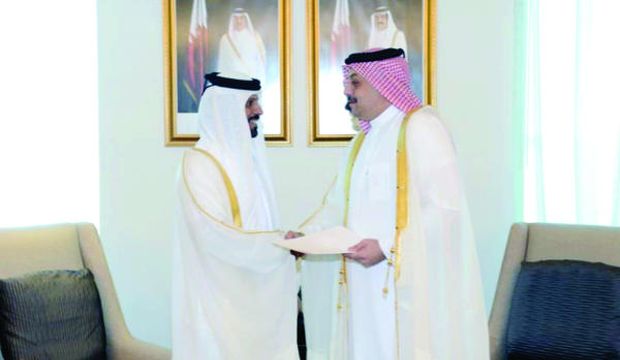
Qatar Foreign Minister Khalid Bin Mohammed Al-Attiyah (R) receives the UAE’s ambassador to Qatar, Salih Bin Mohammed Al-Amiri, in the Qatari capital Doha, on December 2, 2014. (Qatar News Agency)
Abu Dhabi and Riyadh, Asharq Al-Awsat—The UAE’s ambassador to Qatar returned to the country’s capital Doha on Tuesday, in the latest sign of the easing of a months-long rift between the Gulf countries.
Qatari Foreign Minister Khalid Bin Mohammed Al-Attiyah received the ambassador, Salih Bin Mohammed Al-Amiri, in the country’s capital, and expressed hope of continuing and improving bilateral relations between the two Gulf Cooperation Council (GCC) member states.
Amiri was the last of the ambassadors from the three Gulf countries Saudi Arabia, Bahrain and the UAE to return, after all three withdrew their ambassadors from Doha in March amid an inter-GCC dispute that lasted several months.
Both Bahrain and Saudi Arabia’s ambassadors to Qatar returned to Doha last month, just days after an emergency meeting between the leaders of the three countries, Qatar, and neighboring Kuwait, in the Saudi capital Riyadh.
Following the meeting, it was agreed all ambassadors would be returned to the Qatari capital, with the countries’ leaders vowing to “turn over a new leaf” in relations and resuming full diplomatic ties.
The three countries had earlier accused Qatar of interfering in other GCC member states’ affairs, also citing its support for the Muslim Brotherhood organization—which is now banned in all three countries.
This comes ahead of the GCC’s annual summit due to be held later this month in Doha. A preparatory meeting of GCC foreign ministers was held on November 25, an event that usually precedes the annual summit of GCC leaders.
Speaking to Asharq Al-Awsat, Abdullah Al-Hashim, the assistant to the organization’s secretary-general, said that in addition to general regional issues, the GCC leaders would also be discussing the concerns of young people in member states during the summit.
He said member states had already canvassed the views and concerns of 240 young people across GCC countries, which mostly revolved around issues relating to education, healthcare and employment.
Fahd Al-Zayabi contributed additional reporting from Riyadh.

Trackbacks/Pingbacks